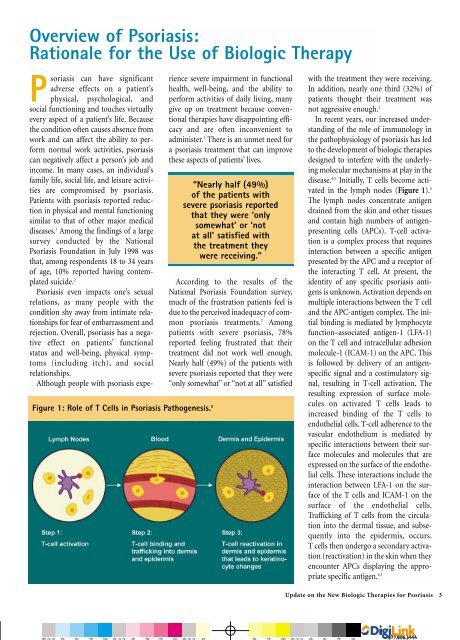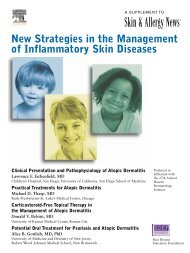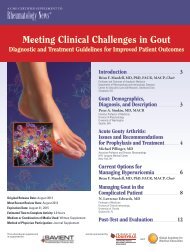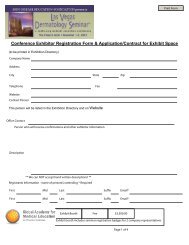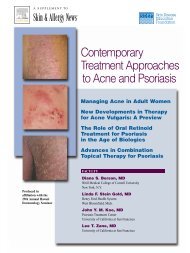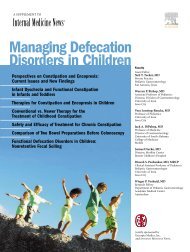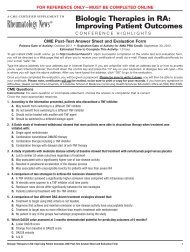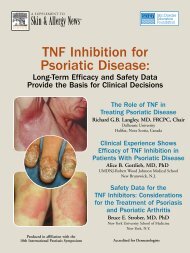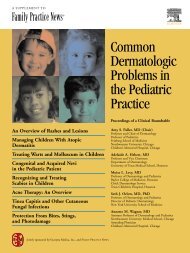Overview Of Psoriasis - Global Academy for Medical Education
Overview Of Psoriasis - Global Academy for Medical Education
Overview Of Psoriasis - Global Academy for Medical Education
You also want an ePaper? Increase the reach of your titles
YUMPU automatically turns print PDFs into web optimized ePapers that Google loves.
<strong>Overview</strong> of <strong>Psoriasis</strong>:<br />
Rationale <strong>for</strong> the Use of Biologic Therapy<br />
Figure 1: Role of T Cells in <strong>Psoriasis</strong> Pathogenesis. 5<br />
<strong>Psoriasis</strong> can have significant<br />
adverse effects on a patient’s<br />
physical, psychological, and<br />
social functioning and touches virtually<br />
every aspect of a patient’s life. Because<br />
the condition often causes absence from<br />
work and can affect the ability to per<strong>for</strong>m<br />
normal work activities, psoriasis<br />
can negatively affect a person’s job and<br />
income. In many cases, an individual’s<br />
family life, social life, and leisure activities<br />
are compromised by psoriasis.<br />
Patients with psoriasis reported reduction<br />
in physical and mental functioning<br />
similar to that of other major medical<br />
diseases. 1 Among the findings of a large<br />
survey conducted by the National<br />
<strong>Psoriasis</strong> Foundation in July 1998 was<br />
that, among respondents 18 to 34 years<br />
of age, 10% reported having contemplated<br />
suicide. 2<br />
<strong>Psoriasis</strong> even impacts one’s sexual<br />
relations, as many people with the<br />
condition shy away from intimate relationships<br />
<strong>for</strong> fear of embarrassment and<br />
rejection. Overall, psoriasis has a negative<br />
effect on patients’ functional<br />
status and well-being, physical symptoms<br />
(including itch), and social<br />
relationships.<br />
Although people with psoriasis experience<br />
severe impairment in functional<br />
health, well-being, and the ability to<br />
per<strong>for</strong>m activities of daily living, many<br />
give up on treatment because conventional<br />
therapies have disappointing efficacy<br />
and are often inconvenient to<br />
administer. 3 There is an unmet need <strong>for</strong><br />
a psoriasis treatment that can improve<br />
these aspects of patients’ lives.<br />
“Nearly half (49%)<br />
of the patients with<br />
severe psoriasis reported<br />
that they were ‘only<br />
somewhat’ or ‘not<br />
at all’ satisfied with<br />
the treatment they<br />
were receiving.”<br />
According to the results of the<br />
National <strong>Psoriasis</strong> Foundation survey,<br />
much of the frustration patients feel is<br />
due to the perceived inadequacy of common<br />
psoriasis treatments. 2 Among<br />
patients with severe psoriasis, 78%<br />
reported feeling frustrated that their<br />
treatment did not work well enough.<br />
Nearly half (49%) of the patients with<br />
severe psoriasis reported that they were<br />
“only somewhat” or “not at all” satisfied<br />
with the treatment they were receiving.<br />
In addition, nearly one third (32%) of<br />
patients thought their treatment was<br />
not aggressive enough. 2<br />
In recent years, our increased understanding<br />
of the role of immunology in<br />
the pathophysiology of psoriasis has led<br />
to the development of biologic therapies<br />
designed to interfere with the underlying<br />
molecular mechanisms at play in the<br />
disease. 4,5 Initially, T cells become activated<br />
in the lymph nodes (Figure 1). 5<br />
The lymph nodes concentrate antigen<br />
drained from the skin and other tissues<br />
and contain high numbers of antigenpresenting<br />
cells (APCs). T-cell activation<br />
is a complex process that requires<br />
interaction between a specific antigen<br />
presented by the APC and a receptor of<br />
the interacting T cell. At present, the<br />
identity of any specific psoriasis antigens<br />
is unknown. Activation depends on<br />
multiple interactions between the T cell<br />
and the APC-antigen complex. The initial<br />
binding is mediated by lymphocyte<br />
function–associated antigen-1 (LFA-1)<br />
on the T cell and intracellular adhesion<br />
molecule-1 (ICAM-1) on the APC. This<br />
is followed by delivery of an antigenspecific<br />
signal and a costimulatory signal,<br />
resulting in T-cell activation. The<br />
resulting expression of surface molecules<br />
on activated T cells leads to<br />
increased binding of the T cells to<br />
endothelial cells. T-cell adherence to the<br />
vascular endothelium is mediated by<br />
specific interactions between their surface<br />
molecules and molecules that are<br />
expressed on the surface of the endothelial<br />
cells. These interactions include the<br />
interaction between LFA-1 on the surface<br />
of the T cells and ICAM-1 on the<br />
surface of the endothelial cells.<br />
Trafficking of T cells from the circulation<br />
into the dermal tissue, and subsequently<br />
into the epidermis, occurs.<br />
T cells then undergo a secondary activation<br />
(reactivation) in the skin when they<br />
encounter APCs displaying the appropriate<br />
specific antigen. 4,5<br />
Update on the New Biologic Therapies <strong>for</strong> <strong>Psoriasis</strong> 3


